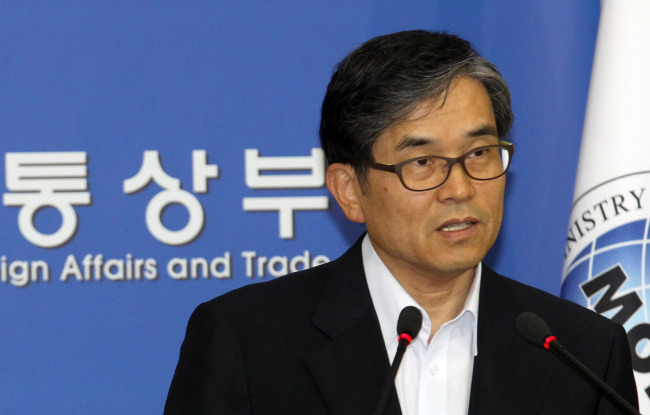Reaching free trade agreement will be harder than expected, says Seoul’s negotiator
Korea and China have confirmed their basic positions on the bilateral free trade agreement, but have yet to reach an agreement on key issues such as the level of tariff concessions and the choice of sensitive and ultra-sensitive items.
The two countries had earlier agreed to carry out the FTA negotiations in two stages, the first of which will be settling the sizes of baskets for general, sensitive and ultra-sensitive items. Other issues will be discussed in the second stage, which will not proceed unless an agreement is reached in the first stage.
Seoul and Beijing wrapped up their second round of FTA negotiations on Jeju Island Thursday, with the next round scheduled to take place in August in China.
During the three-day talks, the two sides exchanged views on how to define ultra-sensitive, sensitive and general items, and agreed to deal with agricultural and industrial products separately under the sensitive and ultra-sensitive categories.
Ultra-sensitive and sensitive items will be excluded from the tariff concessions or will be subject to only partial tariff cuts.
 |
Korea’s chief FTA negotiator Choi Seok-young speaks about the results of the second round of Korea-China FTA talks on Friday. (Yonhap News) |
“Korea is sensitive about agricultural and fisheries products, while China is sensitive about certain industrial goods,” Choi Seok-young, Seoul’s chief FTA negotiator, said in a press briefing Friday.
“Considering the sensitivity, the two sides agreed to divide the agricultural and industrial goods, and handle them separately.”
Once the size of the sensitive items’ box is determined, the percentages of agricultural and industrial products within the box will be set, Choi said.
The negotiating teams led by Choi and Chinese Assistant Minister of Commerce Yu Jianhua began discussing the modalities for negotiations on goods, what should go into the sensitive and ultra-sensitive baskets and the periods of time over which the tariffs on such items should be cut.
“It appears that reaching an agreement will be harder than expected,” Choi said, adding that this part of the negotiation is directly linked to the FTA’s overall level of liberalization.
“The standards for classifying sensitive and ultra-sensitive items as well as the extent of tariff concessions will be discussed in more detail in future negotiations.”
The two countries also exchanged views on how to divide chapters in the FTA during Trade Negotiating Committee meetings.
Korea said it wants separate chapters on government procurement, competition, labor, e-commerce and environment, but China is reluctant, saying it has never put them under separate chapters in FTAs with other countries.
The two sides agreed to set up working groups for negotiations on service and investment under the TNC, and exchanged questions and answers on each other’s laws related to service and investment.
Choi said that there is a consensus with China on including provisions on investor-state disputes under the investment chapter.
Choi said the timing of the talks for a Bilateral Investment Treaty with Taiwan had nothing to do with the ongoing FTA negotiations with China.
Korea and Taiwan held their first meeting late last month to exchange views on the treaty to guarantee investment in each other’s country and plan to begin negotiations in October. Beijing has not said anything about the Seoul-Taipei BIT talks yet, Choi said.
By Kim So-hyun (
sophie@heraldcorp.com)








